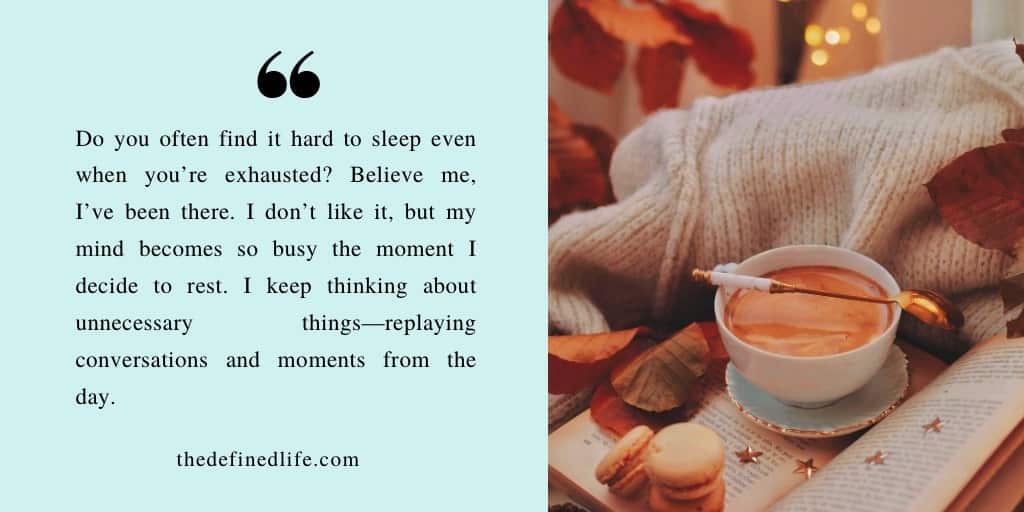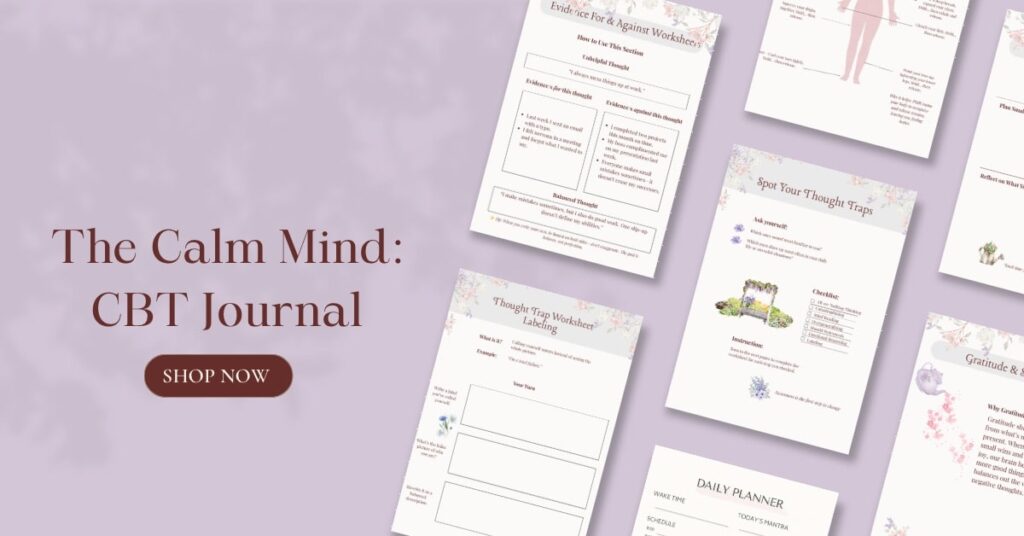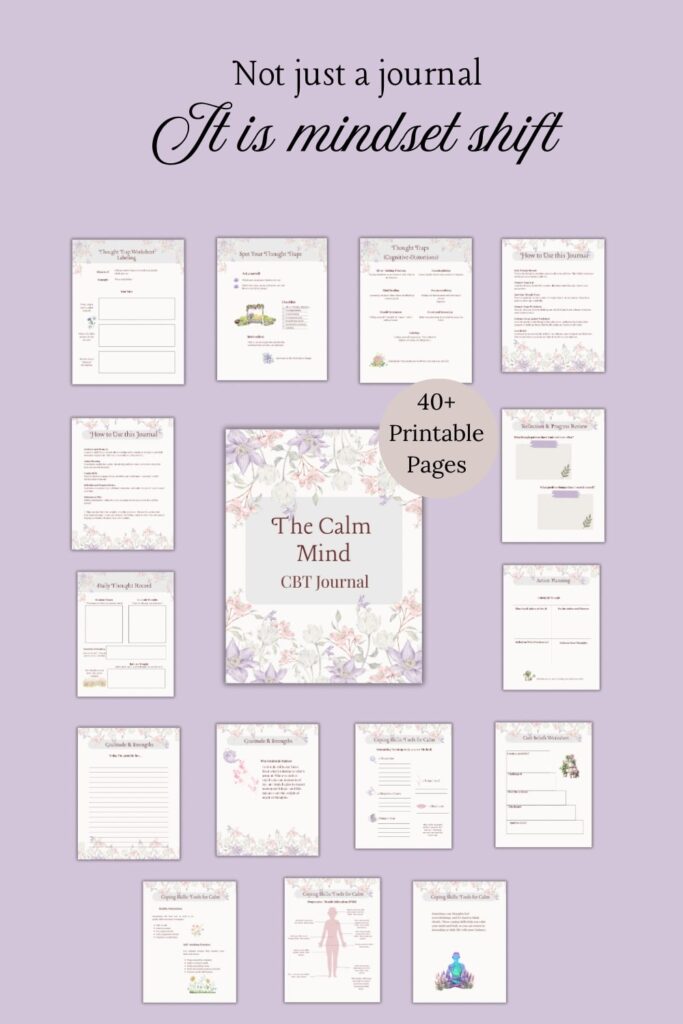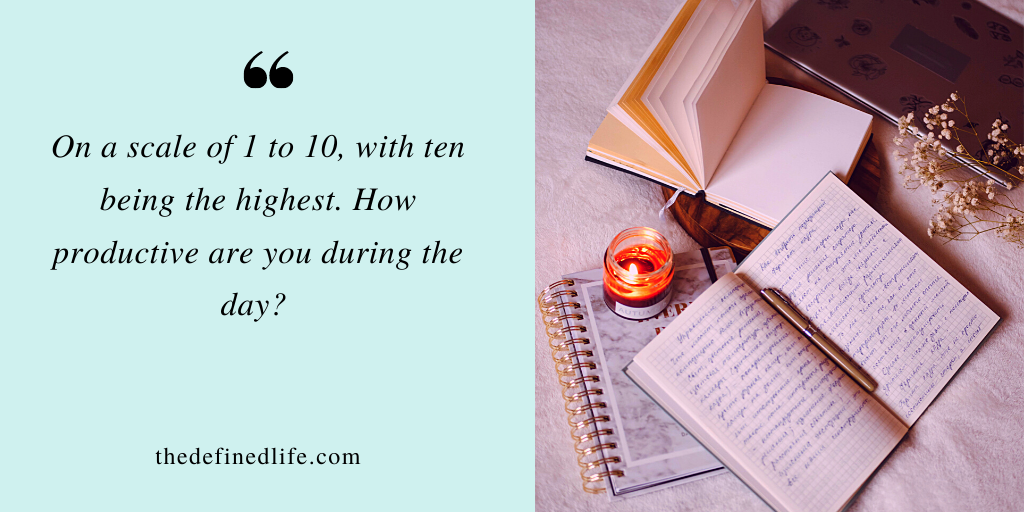
Do you often find it hard to sleep even when you’re exhausted? Believe me, I’ve been there. I don’t like it, but my mind becomes so busy the moment I decide to rest. I keep thinking about unnecessary things—replaying conversations and moments from the day.
I realized that my mind was being consumed by negativity, and I often forgot to recognize the good things that happened.
In this post, I’ll share 25 night journaling prompts and explain why you should start the habit of journaling at night.
Table of Contents
What Is Night Journaling?
Night journaling is a calming, personal ritual where you take a few moments to write before going to sleep.
It’s your time to look back on the day, process what happened, and genuinely check in with yourself about how you’re feeling. It gives you space to unpack lingering thoughts — worries, stress, or even a never-ending to-do list — and gently set them aside.
Think of it as releasing your thoughts onto the page, creating room for clarity and calm.
You don’t need to spend a lot of time journaling at night. Even five to ten quiet minutes can help you clear your head, settle your emotions, and create the stillness needed for deeper, more restful sleep.
Why You Should Try Night Journaling
It helps quiet a busy mind.
Have you ever tried to sleep, only to find your thoughts spinning like a movie reel you can’t turn off? Writing them down breaks that loop. Once your thoughts are on paper, they stop demanding space in your head. It’s like telling your mind, “I’ve got it from here. You can rest now.”
If you often find your thoughts spiraling at night or struggle to stop overanalyzing your day, CBT (Cognitive Behavioral Therapy) journaling can make a big difference. My CBT Planner is designed to help you catch and reframe those unhelpful thought patterns, so you can end each day feeling lighter, calmer, and more in control of your mind. It’s the perfect next step if you’re ready to turn nightly reflection into real emotional growth.
It helps you sleep better.
When your mind slows down, your body follows. Journaling before bed signals to your brain that it’s time to unwind. Those few minutes of reflection become your gentle bridge from doing to resting — a calming pause between your day and your dreams.
It deepens your self-awareness.
As you write each night, you begin to notice patterns — what triggers stress, what lifts your mood, and what moments bring you peace. Over time, you start understanding yourself on a more honest and compassionate level.
It nurtures gratitude.
Ending the day with gratitude changes how you view life. You begin to remember the laughter you almost forgot, the quiet moments that felt good, and the little things that went right. These reflections soften your heart and make sleep come easier.
So if your mind tends to stay awake long after your body is ready to rest, night journaling might be the peaceful ritual you’ve been needing.

How to Use These Prompts
1. Choose a quiet space before bed.
Find a spot that feels peaceful — your bed, a cozy chair, or even by the window where you can feel the night air. This is your time to slow down and breathe. Let the noise of the day fade before you start writing.
2. Keep your phone away — light a candle or use dim lighting.
Try to stay away from screens for a while. Soft lighting helps your body relax and tells your brain it’s time to rest. If you like, light a candle, play gentle music, or simply sit in the quiet — whatever makes you feel calm and safe.
3. Pick one or two night journaling prompts from the list.
You don’t have to do them all. Just choose one or two that speak to you tonight. Some evenings you might reflect deeply; other nights, a few short lines will do. Go with what feels right in the moment.
If you often find your thoughts spiraling at night or struggle to stop overanalyzing your day, CBT (Cognitive Behavioral Therapy) journaling can make a big difference. My CBT Planner is designed to help you catch and reframe those unhelpful thought patterns, so you can end each day feeling lighter, calmer, and more in control of your mind. It’s the perfect next step if you’re ready to turn nightly reflection into real emotional growth.

4. Write freely without editing yourself. Let your thoughts flow naturally.
Don’t worry about grammar or structure. This is your private space — no one’s judging. Let your words wander where they need to. The best insights often come when you stop trying to sound perfect and just write from the heart.

25 Night Journaling Prompts for a Peaceful Mind
Each of these prompts helps you slow down, process your thoughts, and create a peaceful rhythm before bed. Choose one or two each night — no rush, no pressure. Just you, your pen, and the quiet.
1. What moments from today made me feel at peace?
Ending the day by noticing peaceful moments trains your mind to focus on calm instead of chaos. It’s a way of reminding yourself that serenity did exist — even if the day was messy.
2. What’s something that challenged me, and how did I handle it?
Reflecting on challenges helps you build confidence. You realize that you’ve been capable all along, even on days that felt tough.
3. What emotions showed up for me today?
Naming emotions takes away their power to control you. When you acknowledge them, you allow your mind to rest instead of carrying unspoken feelings into the night.
4. What’s one thing I can forgive myself for tonight?
Letting go of self-blame before bed makes space for emotional healing. You deserve rest — not guilt.
5. What thoughts or worries do I want to release before sleeping?
This helps you clear your mental clutter. By writing down your worries, you’re telling your brain it doesn’t need to hold onto them while you sleep.
6. How did I take care of myself today — even in small ways?
Recognizing small acts of self-care builds self-compassion. It reminds you that caring for yourself doesn’t always mean big gestures — sometimes it’s just taking a breath.
7. Who or what made my day a little brighter?
Focusing on positive connections nurtures gratitude and warmth — two feelings that make sleep come easier.
8. What’s one lesson I learned from today’s experience?
Journaling lessons turns ordinary days into moments of growth. You’ll start to see how even rough days teach something valuable.

9. What am I grateful for right now?
Gratitude shifts your focus away from what’s missing and toward what’s already good. It’s one of the simplest ways to end your day with peace.
10. What do I want to remember about today a year from now?
This helps you capture fleeting memories before they fade. You start valuing small joys that might have otherwise gone unnoticed.
11. What kind of energy do I want to wake up with tomorrow?
Visualizing tomorrow sets a gentle intention. It turns journaling into a nightly reset — your bridge between today and a better morning.
12. What beauty did I notice in my surroundings?
Writing about beauty, even in small things, trains your eyes to see more of it. Over time, it softens your perspective on life itself.
13. What part of my day felt the most meaningful?
This helps you recognize what truly matters to you. You’ll start shaping your days around what brings fulfillment instead of just routine.
You might also want to check out 7 Uplifting Morning Journal Prompts.
14. What do I need to hear before I fall asleep?
Sometimes, reassurance needs to come from you. Writing it down turns your journal into a safe, comforting voice at the end of the day.
15. What am I ready to let go of tonight?
Letting go before bed keeps emotional weight from following you into tomorrow. It’s like unclenching your mind after holding on all day.
16. What did I accomplish today that I’m proud of?
Acknowledging small wins builds quiet confidence. You’ll stop ending days with “not enough” and start recognizing progress.
17. What boundaries did I honor today?
Reflecting on this helps you stay aligned with your needs. Protecting your peace is a form of self-respect — and that’s a beautiful way to end the night.
18. What drained my energy — and how can I protect it tomorrow?
Awareness is power. Once you see what’s draining you, you can make conscious choices to guard your energy better next time.
19. What kind thing did I do for someone today?
Acts of kindness lift your mood and create emotional warmth. Noticing them reminds you that you’re already spreading light.
20. How did I show love to myself today?
Self-love is often quiet — a nap, saying no, or choosing rest. Writing it down helps you honor those moments without guilt.
21. What do I need more of in my life right now?
This prompt opens gentle self-awareness. It helps you listen to what your heart has been whispering beneath the noise.
22. What thoughts do I want to carry into my dreams?
Ending the night with hopeful thoughts sets the tone for rest. It’s a way of steering your mind toward calm instead of worry.
Check this post on how to start a dream journal.
23. What’s something I want to thank myself for?
You deserve appreciation too. Gratitude toward yourself deepens self-respect and emotional healing.
24. What does a peaceful evening look like for me?
Imagining peace helps you create it. This reflection turns into a simple reminder of what balance truly feels like.
25. What reminder do I want to wake up with in the morning?
This closes your journaling practice with purpose. It’s like leaving a gentle note for tomorrow’s version of you — calm, grounded, and ready.

Final Thoughts on Night Journaling Prompts

Night journaling may look as simple as writing down thoughts before bed — but it’s truly about ending the day with mindfulness and calm.
When you take a few quiet minutes to reflect, you’re teaching your mind to let go of noise and return to peace.
If you want to take this practice a little deeper, here are a few tools that can support you:
- The Calm Mind: CBT Journal – Perfect if you tend to overthink or spiral before bed. It guides you through gentle reflection steps to calm racing thoughts.
- Mindfulness Journal – A lovely companion for quiet evenings. It helps you stay present, practice gratitude, and nurture emotional awareness.
- Junk Journal Kits – If you’re more visual or creative, these themed kits let you turn your nightly reflections into art. They’re especially great for preserving memories or decorating your written pages.
No matter which path you choose, what matters most is that you create space for peace — one page, one night at a time.









Leave a Reply